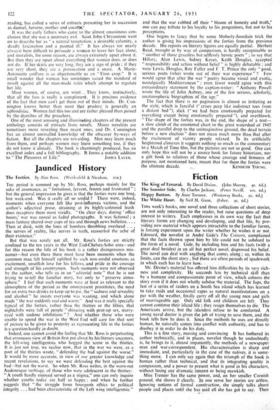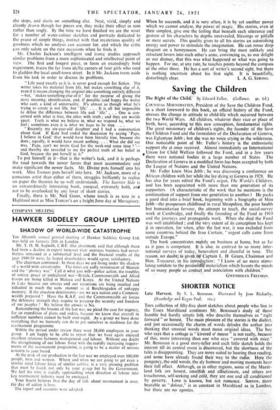Fiction
THIS week's books, one novel and three collections of short stories, are not only interesting to the reader, but raise questions of deep interest to writers. Each emphasises in its own way the fact that literary forms are changing and developing, and that life, by pro- viding new material which appears intractable to the familiar forms, is forcing experiment upon the writer whether he wishes it or not. Edouard, the novelist in Andre Gide's The Colliers, complained that the facts thrown upon him by life could not be subdued to the form of a novel. Gide, by including him and his facts (with a great deal besides) in an all but perfect novel, disproved his belief. The novel can deal with anything that comes along ; so, within its limits, can the short story ; but there arc often periods of spadework in which each has to learn how.
Mr. Divine's material has offered him difficulties by its very rich- ness and complexity. He succeeds less by technical skill than by a humane and compassionate point of view, which colours the story even if it does not wholly subdue the material. The Japs, the last of a series of raiders on a South Sea island which has learned to take raids and occasional rapes as natural manifestations on a par with the weather, finally carry off all the young men and girls of marriageable age. Only old folk and children are left. They cannot continue their island life ; they resign themselves to die. The Americans arrive, but the islanders refuse to be comforted. A young naval doctor is given the job of trying to save them, and the book tells how he does it. Since the methods he uses are directly human, he naturally comes into conflict with authority, and has to disobey it in order to do his duty.
This is a fine story, moving and convincing It has bothered its author technically, and in places, novelist though he undoubtedly is. he brings to it, almost impatiently, the methods of a newspaper man and war-correspondent. His characterisation is sharp and immediate, and, particularly in the case of the natives, it is some- thing more. I can only say again that the triumph of the book is human rather than technical, and that its integrating quality is compassion, and a power to present what is good in his characters, without losing any dramatic interest or being mawkish.
Miss Treneer has the same power, and, on her smaller Cornish ground, she shows it clearly. in one sense her stories are artless. Ignoring notions of formal construction, she simply talks about people and places until she has said all she has got to say. Then she stops, and starts on something else. Neat, vivid, simply and cleanly drawn though her pieces are, they make their effect in sum rather than singly. By the time we have finished we are the wiser for a number of water-colour sketches and portraits dedicated to the praise of simple things, instinct with that mysterious quality of goodness which no analysis can account for, and which the critic can only salute on the rare occasions when he finds it. Mr. Charles Jackson's intelligent and ironic studies approach similar problems from a more sophisticated and intellectual point of view. The first and longest piece, in form an exceedingly bold experiment, traces the far from idyllic careers of four girls who used to gladden the local small-town street. In it Mr. Jackson turns aside from his task in order to discuss its problems.
" Life used exactly as it is. is never good enough for fiction. The writer takes his material from life, but makes something else of it, even if it means changing the original into something entirely different —but, 'makes-something-else-of-it ' for the purpose of giving the story meaning. identification, and, if possible (and happy the writer who ran), a kind of universality. It's almost as though what he's trying to create is not life, but ' life.' . . . It is all but impossible to define the difference between life and ' life.' . . . One is con- cerned with what is true, the other with truth ; and they are worlds apart. Truth is what we believe in, what we respond to, what we feel ; sometimes even it is what we hope to be true. . . . " Recently my six-year-old daughter and I had a conversation about God. If Kate had ended the discussion by saying ' Papa, 1 believe in God,' that would have been literally true, because she does ; equally, it would have meant nothing. .. . What she did say was, 'Papa, can't we invite God for the week-end some time ? '- and thereby she revealed to me the perfect truth of her belief in God, because she put herself in it."
To put himself in it—that is the writer's task, and it is perhaps the road towards the newer forms that must accommodate and make significant the newer facts. Mr. Divine puts himself into his work. Miss Treneer puts herself into hers. Mr. Jackson, more of a conscious artist than either of them, struggles brilliantly to realise on paper the theories he so well understands. The Sunnier Side is an extraordinarily interesting book, unequal, extremely bold, and not to be overlooked by any lover of short stories.
Finally, there is Mr. Neil Gunn, whose touch is as sure in a Highland mist as Miss Trencer's on a bright•June day at Mevagissey. When he succeeds, and it is very often, it is by yet another power which we cannot analyse, the power of magic. His stories, even at their simplest, give one the feeling that beneath each utterance and gesture of his characters lie depths unrevealed, blessings or pitfalls or mere secrets. This quality gives to all his stories an astonishing energy and power to stimulate the imagination. He can rouse deep disquiet on a honeymoon. He can bring the most unlikely and reluctant lovers into each other's arms, convincing us, to our delight or our dismay, that this was what happened or what was going to happen. For me, at any rate, he touches points beyond the compass of the other three. He has a sort of writer's second sight, but there is nothing uncertain about his first sight. It is beautifully,







































 Previous page
Previous page